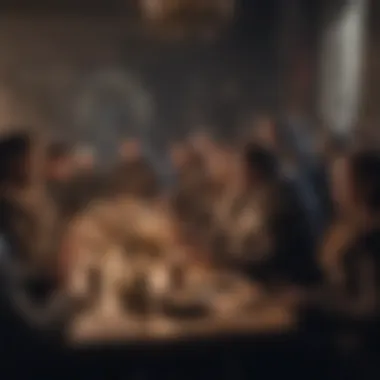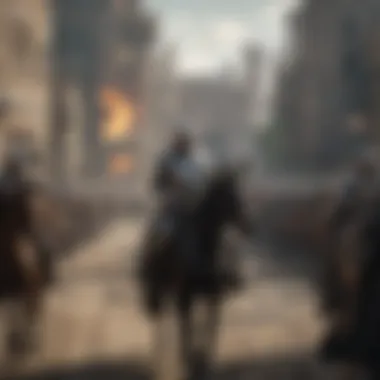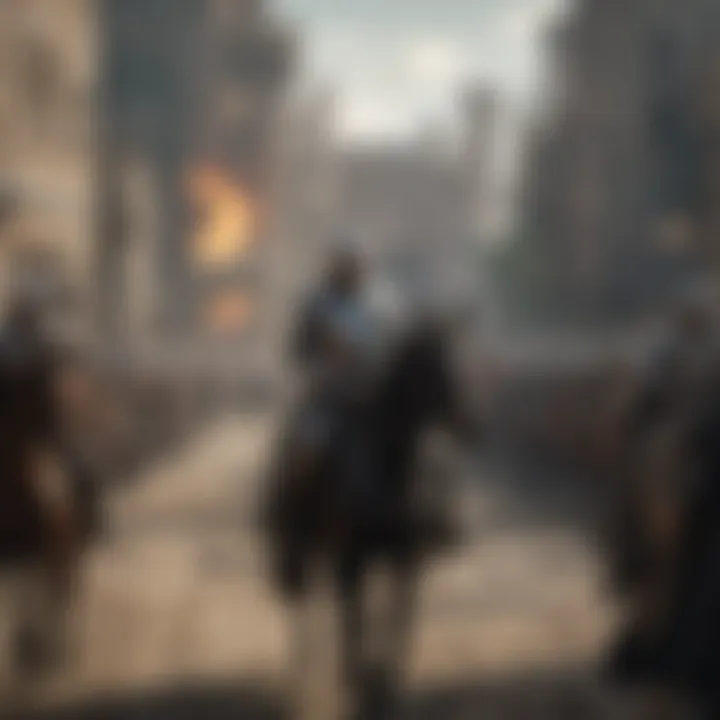Old Ways: Unraveling Westeros' Rich Heritage


Intro
Westeros, the vivid and multifaceted backdrop of Game of Thrones, is steeped in rich traditions and historical narratives. Understanding these foundations is essential in grasping the complexities of character motivations and power dynamics within the world. The cultural practices, moral codes, and pivotal events all weave together to form the intricate lattice of social interaction that defines Westeros. This article will dissect these elements to reveal why the past remains a powerful influence in the lives of its inhabitants today.
Character Dissections
Analysis of Key Characters
Each character in Game of Thrones is imbued with depth, shaped by their backgrounds and the old ways they embody. For instance, consider the Stark family. Their adherence to the ancient code of honor drives many decisions and conflicts. Eddard Stark’s unfaltering commitment to this ethos serves as a poignant example of how the values of the past resonate throughout the series.
In contrast, characters like Cersei Lannister represent a more cynical interpretation of these traditions, using them to manipulate and gain power. This dichotomy highlights how diverse interpretations of the past influence characters' motivations.
Character Development
Throughout the series, viewers witness significant character arcs informed by historical influences. Jon Snow evolves from an outsider, struggling with his illegitimacy, to a leader who embodies the old ways of the North. His journey reflects a deeper understanding of honor and duty, shaped by his lineage and the influence of figures like Eddard Stark.
Conversely, Daenerys Targaryen's rise exemplifies the tension between the past and present. Her struggle to reclaim her family's legacy shapes her decisions, often leading to moral dilemmas that challenge traditional notions of power.
Impact on Storyline
These characters, with their deeply ingrained ties to the old ways, ultimately shape the narrative's course. Each decision made, rooted in historical context, ripples through the storyline, affecting alliances and conflicts across Westeros.
"The past is never dead. It's not even past."
— William Faulkner
The remembrance of historical events impacts the ongoing struggles between families and factions, illustrating how the legacies of the old ways are constantly at play.
Lore Explorations
Rich History of Westeros
The lore of Westeros is a complex tapestry of myths, legends, and historical facts. Each region boasts its own stories that inform the cultural practices of its people. For example, the Ironborn adhere to a philosophy based on a deep respect for strength and raiding, a reflection of their harsh environment.
Moreover, the lore provides critical context for the current conflicts. The ancient stories of the First Men, the arrival of the Andals, and the fall of House Targaryen serve as backdrops against which contemporary events unfold.
Hidden Details and Connections
Delving into the lore allows fans to uncover hidden intricacies that enhance the viewing experience. Small details, like the significance of the direwolf in House Stark or the symbolism behind the Iron Throne, reveal layers of meaning that enrich narrative comprehension.
Cultural and Mythical Aspects
The old ways are also deeply intertwined with mythical elements, such as dragons, giants, and the supernatural. These components add to the complexity of the world, as they often represent the unknown and the consequences of straying from ancient traditions.
Fan Theories
Popular and Intriguing Theories
As fans engage with the material, numerous theories emerge, often grounded in the rich lore and character histories. A notable theory revolves around the idea that Jon Snow may actually be Azor Ahai, a prophesied hero in Westerosi lore. Such theories not only showcase fan engagement but also illustrate how old narratives continue to shape contemporary discussions about character arcs and potential plot developments.
Evaluation of Theories
Evaluating these theories requires critical examination of evidence from the show and accompanying literature. As the series unfolds, clever foreshadowing has led fans to connect certain occurrences back to long-standing legends and character histories.
Ultimately, the clash between past and present remains a central theme. As the series progresses, audiences are left to speculate how deeply ingrained traditions will influence the fates of familiar characters. For dedicated fans, unraveling these layers creates a richer, more nuanced viewing experience.
Intro to the Old Ways
The concept of the "Old Ways" serves as a crucial underpinning in understanding the world of Westeros. The traditions and customs established long ago shape the actions of individuals and families amid the chaos of the realm. Exploring these foundational elements offers insightful perspectives on the motivations of key characters and the prevailing social structures.
In this article, we delve into various dimensions of the Old Ways. We will examine the historical context, cultural practices, and moral codes that influence decisions and relationships. By unpacking these aspects, we provide a clearer understanding of how history and tradition impact both the storyline and character development in Game of Thrones.
Defining the Old Ways
The Old Ways refer to long-standing traditions, customs, and beliefs that have persisted through generations in Westeros. These practices encompass feudal obligations, rituals tied to the seasons, and moral codes that dictate personal honor and loyalty. Understanding the Old Ways is essential, as they form the framework within which characters operate.
Most importantly, the Old Ways are not merely nostalgic; they are actively engaged in shaping the political landscape and interpersonal relationships in Westeros. Families uphold these traditions, often leading to alliances, conflicts, and even heartbreak. Topics such as the Stark's commitment to honor illustrate how deep-rooted beliefs influence decisions that span generations.
Significance in Game of Thrones


The significance of the Old Ways in Game of Thrones cannot be overstated. They provide a historical tapestry that enriches the narrative. The power dynamics seen throughout the series often hinge on adherence to or rebellion against these traditions. Key events, such as battles for the Iron Throne, are frequently rooted in the rivalries and loyalties established by these ancient customs.
Characters like Ned Stark, who symbolizes honor and duty, and Jaime Lannister, whose journey involves grappling with the costs of the Old Ways, showcase the complexities of adhering to these traditions. The tension between loyalty to family and personal ambition becomes a central theme, driving much of the action within the series.
"In Westeros, following the Old Ways can mean the difference between life and death."
As we traverse this article, we will unpack these intricate relationships and the lessons they present. Traditional values can't be dismissed as mere relics but are instead pivotal to understanding the motivations that drive the characters and the overarching plot of Game of Thrones.
Historical Context of Westeros
The historical context of Westeros is essential to understanding the intricacies of its current society and politics. This period marks the foundation upon which the realm’s traditions, cultural practices, and belief systems were built. By examining the early history of Westeros, we can deduce how the past informs character motivations and influences power dynamics within the ongoing narrative.
The Age of Heroes
The Age of Heroes is often romanticized as a time of legendary figures and monumental deeds. This period is significant as it sets the stage for many of the traditions that permeate Westerosi culture. It is during this era that the first heroes emerged, like Bran the Builder and Lann the Clever, whose actions continue to echo through the ages. The establishment of the Wall by Bran the Builder, for example, symbolizes the ever-present threat of the Others, influencing both political and cultural views regarding the North.
This age represents a blend of myth and reality. The stories passed down through generations have shaped the identity of houses, influencing their values and ethics. Icons from this time are not merely characters of folklore, but archetypes that inform the decisions of prominent families, including the Starks’ sense of honor or the Lannisters’ cunning. Understanding this age is vital for any analysis of present conflicts because it emphasizes how the past consistently resurfaces in contemporary challenges.
The Targaryen Conquest
The Targaryen Conquest marks another pivotal moment in Westeros's history, solidifying the Targaryen dynasty's grip on the realm. Aegon I Targaryen, known as Aegon the Conqueror, utilized his dragons to unite the Seven Kingdoms under one rule. This event not only altered the political landscape but also set profound implications for the moral codes and cultural practices that govern Westeros today.
Aegon's conquest was not merely about gaining power; it was an ideological shift that emphasized the divine right of kings. The Targaryens implemented a feudal system that fundamentally shaped the political hierarchy, influencing loyalty structures and familial alliances. This legacy of power struggle and alliance remains visible in the skirmishes and rivalries that characterize the series.
In summary, the historical context of Westeros provides a rich backdrop that informs the audience about the conditions faced by the characters. The Age of Heroes and the Targaryen Conquest serve as critical elements in this narrative, illustrating how historical events weave the fabric of current societal norms, challenges, and relationships. By understanding these histories, viewers can appreciate the depth of characters' motivations, making the intricate web of alliances and enmities much clearer.
"The past never dies. It isn’t even past." - William Faulkner
Through this exploration, fans of Game of Thrones can attain a nuanced understanding of the realm's complexities and the continuation of its foundational myths and events.
Cultural Practices and Traditions
Cultural practices and traditions serve as the lifeblood of any society, and in Westeros, they are deeply entrenched in everyday life. The importance of these practices cannot be overstated, as they give a sense of identity and continuity to the people. In the context of Game of Thrones, these practices provide not only a backdrop for character motivations but also shape the political landscape. Understanding these traditions yields profound insights into how past events influence present actions, making the exploration of this topic essential for any fan.
Feudalism as a Cultural Bedrock
Feudalism in Westeros is more than a system of governance; it represents a cultural bedrock that dictates social hierarchy and interpersonal relationships. The realm is divided into houses, each ruled by a lord who owes allegiance to a greater lord or king. This hierarchical structure brings stability but also breeds competition and conflict. Lords grant lands to vassals with the expectation of loyalty and military service, fostering a sense of honor tied to property and lineage.
This arrangement influences the characters’ decisions and alliances significantly. For instance, Eddard Stark’s rigid adherence to honor illustrates the weight of feudal loyalty and duty. He risks everything to uphold the Stark name, demonstrating how tradition shapes character motivations.
It’s also worth noting the brutality inherent in this system. The lack of social mobility means that birthright often decides one's fate. In this light, the old ways reinforce existing power dynamics, perpetuating inequality and conflict. Characters like Robb Stark grapple with these constraints, as their choices and loyalties reflect the complex interplay between tradition and ambition.
Rituals and Festivals
Rituals and festivals play a central role in uniting the people of Westeros. They serve as moments of communal joy, remembrance, and reflection. Events such as the Harvest Festival and the various wedding traditions enhance social bonds and reinforce the cultural identity of different regions. These gatherings are not mere celebrations; they often hold historical significance and reflect the values that the society cherishes.
For example, the ritual of the King's Landing Hand Feast is not just a display of power but also a reminder of duty and loyalty among the nobility. Here, we see how hospitality can be a political tool, intertwining personal relationships with broader political aspirations.
Moreover, rituals often have a spiritual dimension, reminding characters of their obligations not just to each other but to the gods they believe in. The prayers offered at the Weirwood trees or during the worship of The Seven illustrate how faith is intertwined with tradition in shaping moral codes.
"Tradition runs deep in Westerosi culture, forming unseen barriers and bridges among its people."
These collective practices highlight how the past informs present behavior, making them vital for understanding the motivations of the series’ characters. Overall, the study of cultural practices and traditions offers insights into the complexities within Game of Thrones, enhancing both engagement with the narrative and comprehension of the underlying social structures.
Moral Codes and Ethics
The moral codes and ethics found in Westeros significantly shape the narrative of Game of Thrones. These codes, rooted in a combination of cultural traditions, historical narratives, and the practical application of power, illuminate the motivations behind character actions and societal structures. Examining these elements provides valuable insight into how folklore, honor, and loyalty intertwine to create a web of relationships within the realm.
Understanding these moral codes is essential, as they define the expectations placed upon individuals, especially those in positions of power. In Westeros, the perception of honor and reputation often guides critical decisions, which can lead to both nobility and tragedy. The established ethics form a societal framework where loyalty can mean the difference between life and death.
Honor and Chivalry
Honor is the backbone of noble life in Westeros, fundamentally tied to the concept of chivalry. Chivalry encompasses not only martial prowess but also ethical behavior and respect for fellow nobles. The ideal knight is expected to uphold their family's honor and act with integrity, even in dire circumstances. For instance, characters like Ned Stark exemplify these noble values, making decisions based on duty despite the consequences they may face.
The social fabric of Westeros is reinforced by these ideals. Characters are often judged by their adherence to or deviation from these codes. Such scrutiny fosters tension and conflict, propelling character arcs throughout the story. The tragic fate of many characters reveals how rigid adherence to a personal code of honor can lead to their downfall. Thus, honor remains a double-edged sword—noble yet perilous.
The Role of Loyalty
Loyalty plays a crucial role in the moral landscape of Game of Thrones. It defines relationships among houses and individuals. Loyalty to family, house, or king can motivate characters to commit extreme acts in defense of their beliefs or kin.


Following are some key aspects of the importance of loyalty:
- Familial Loyalty: The bonds of family drive many characters, influencing decisions that can alter their fates. Characters such as Jaime Lannister, who initially acts out of loyalty to his family, later face moral dilemmas that challenge these structures.
- Political Alliances: The alliances formed between houses often hinge on loyalty promises. Betrayals can lead to chaos, exemplified by the Red Wedding, where loyalty is shattered, leading to gruesome consequences.
- Personal Loyalty: Characters often make personal choices based on loyalty to friends, mentors, or beliefs. For instance, Jon Snow's loyalty to the Night's Watch represents an internal moral struggle, impacting his relationship with other characters.
Loyalty, in its various forms, serves as both a unifier and a divisive force in the complex world of Westeros, making it an integral part of the overarching moral codes.
By exploring the intricacies of honor and loyalty in Westeros, one gains a deeper appreciation for the narrative’s complexity and the characters' motivations. These moral tenets not only shape plot lines but also reflect the foundational ideals that resonate through time, painting a vivid picture of life in this mythical realm.
Power Dynamics and Politics
Power dynamics and politics are crucial to understanding the framework of Westeros. The struggle for power defines the actions of nearly every character in the narrative. The balance of power is a constant theme, affecting not only the rulers but also the common folk. The old ways of Westeros have created a political landscape where alliances are formed and broken, and loyalties can shift. Every character’s motivations can often be traced back to these intricate power structures, illustrating how history and tradition shape the political arena.
The political landscape in Westeros is laden with complexity. Different houses are at the center of these dynamics. Each house has its own agenda, values, and resources. Understanding these factors is crucial for grasping the story's development. It influences everything from character arcs to major plot points.
House Alliances and Rivalries
House alliances and rivalries serve as the backbone of the political drama. Key houses like Stark, Lannister, and Targaryen exemplify the interplay of loyalty and betrayal. These relationships are not merely personal but deeply political. The concept of alliances often reflects strategic necessities rather than genuine trust.
For instance, the initial alliance between the Stark and Lannister houses shows a moment of cooperation. However, it quickly devolves into rivalry as ambitions clash. This kind of shifting loyalty creates a sense of unpredictability that is central to the series. Some notable points regarding house dynamics include:
- Marriage Alliances: Often used to solidify power, these unions also serve as a tool for political maneuvering.
- Betrayals: Characters like Petyr Baelish expertly exploit the rivalries to advance their own status, sometimes at great cost.
- Public Perception: The way houses are perceived can influence political leverage. For example, the reputation of the Stark house as honorable impacts its ability to forge agreements.
"In the game of thrones, you win or you die. There is no middle ground." - Cersei Lannister
The Iron Throne and Its Implications
The Iron Throne epitomizes ultimate authority in Westeros, representing both power and danger. Its seat binds the fate of the entire realm. Control of the Iron Throne means access to resources, military power, and the ability to enact laws. Clashing desires to claim this throne send rippling effects throughout the society.
The implications of the Iron Throne extend beyond simple rulership. It symbolizes a historical burden. Those who sit upon it inherit not just power but also expectations and past grievances. The political machinations surrounding the throne reveal a continuous cycle of violence and ambition. Noteworthy aspects include:
- The Costs of Power: Characters like Aerys II Targaryen, also known as the Mad King, illustrate the destructive possibilities of power untempered by wisdom.
- Influence on Characters: The desire for the throne motivates many characters, leading to their ultimate downfall or success.
- Political Conflicts: Struggles for control promote widespread conflict, emphasizing the chaotic nature of politics in Westeros.
Understanding the power dynamics of Westeros is essential for grasping the broader themes of loyalty, ambition, and the consequences of ambition. The relationships between houses, along with the ramifications of seeking the Iron Throne, lay the groundwork for the tales of betrayal and struggle that define the Game of Thrones saga.
Impact of the Old Ways on Characters
The influence of the old ways permeates every aspect of character development in the realm of Westeros. Understanding how history, tradition, and cultural practices shape the decisions and motivations of key figures lays foundational insight into the narrative complexities of Game of Thrones. This section illuminates how deeply-rooted values inform character arcs, prompting viewer engagement with the intrinsic struggles faced by each individual.
Character Arcs Shaped by History
Characters in Game of Thrones often serve as vessels through which the lessons of the past are expressed. Their arcs frequently reflect the impact of historical events and established traditions, underscoring how these factors mold their identities. For instance, Jon Snow's journey as a member of the Night's Watch showcases the enduring weight of ancient allegiances and oaths. The ideals of duty and honor are central to his character, driven by a lineage tied to the Stark family and the ominous legacy of the Wall.
Similarly, Daenerys Targaryen's path is steeped in the consequences of her family's historical legacy. With the trauma of her forebears’ downfall, her quest to reclaim the Iron Throne is driven by a blend of ambition and a desire to restore what was lost. Her development illustrates the costs of historical narratives that compel individuals to act based on prior injustices.
The character of Tyrion Lannister brings another layer to the discussion. Despite his noble birthright, his experiences as an outcast shape his worldview, making him adept at navigating the treacherous waters of Westerosi politics. Tyrion's wit and intellect stem from a necessity to adapt to the expectations of a society that dismisses him due to his size. In this way, the old ways act as both a constraint and a catalyst for character evolution, offering complex portraits of resilience and adaptability.
The Influence of Tradition on Decisions
Tradition plays an important role in guiding the choices made by the characters, often acting as a double-edged sword. The dichotomy lies in how tradition can offer guidance yet also restrict freedom. Many characters face dilemmas when their personal desires conflict with the traditions they are expected to uphold.
Take Sansa Stark, for example. Raised in Winterfell, her character arc starts with an idealized view of chivalry and romance. Over time, she confronts the harsh realities of political maneuvering and the necessity of survival in a patriarchal society. Her evolution from a naive girl to a strategic player in the game of thrones is representative of how adherence to tradition can warp personal aspirations yet also provide valuable lessons in resilience.
Moreover, the conflict between different factions showcases how tradition influences alliances and rivalries. The ongoing power struggle among houses often hinges upon long-standing customs and blood feuds. Characters like Cersei Lannister embody a profound connection to tradition, yet she manipulates it to fortify her position, demonstrating how pragmatic decisions can stem from longstanding cultural contexts.
Ultimately, the interplay between character arcs and the old ways enhances the narrative depth of Game of Thrones. Each decision made by characters isn't merely personal but resonates with historical and cultural significance, illustrating how legacy influences both the individual and collective actions within the series.
"In Westeros, decisions are rarely made in isolation. The past looms large, and every choice reverberates through the ages."
As viewers, understanding these dynamics allows for a richer engagement with the series, revealing the intricate tapestry woven from history, culture, and personal struggle.
Dissonance Between Old and New
The tension between tradition and modernity significantly influences the narrative landscape of Westeros. In the world of Game of Thrones, where character motivations and power structures are deeply rooted in historical practices, this dissonance shapes not only individual choices but also the trajectory of whole houses. The importance of understanding this dichotomy lies in recognizing how characters navigate through the expectations of the past while responding to the challenges presented by contemporary circumstances.
Rebellion Against Tradition
Rebellion against tradition is a recurring theme in the series, often depicted through key characters who question the status quo. For instance, Daenerys Targaryen's journey embodies this struggle. Raised to reclaim her family's throne, she initially adheres to the old ways of her ancestry. However, as she learns the dire consequences of absolute power, she seeks to redefine leadership. Daenerys grapples with the weight of her lineage versus the ethical implications of her actions.


Similarly, Jon Snow’s rise as a leader reveals a nuanced perspective on tradition. Although Jon is bound by the code of honor prevalent in the Night’s Watch, he grows to understand the need for adaptation in the face of new threats. His decisions, often at odds with traditional approaches, signify a shift towards pragmatism rather than blind adherence to past practices. This personal rebellion highlights the tension evolving within Westeros where ancient customs collide with the demands of an unpredictable future.
- Key characters like Daenerys and Jon illustrate the struggle between past commitments and the need for change.
- Their narratives showcase how individual choices can challenge systemic expectations.
"What is honor compared to a woman’s life?" - This sentiment voiced by Ned Stark encapsulates the dilemma faced by many characters when contemplating the sacrifices demanded by old traditions.
Modernity vs. Ancient Practices
The conflict between modernity and ancient practices epitomizes the fashion in which Westeros grapples with its historical roots. Throughout the series, the integration of contemporary ideals surfaces as characters confront age-old customs. This evolution is evident in the varying degrees of acceptance of change among different houses.
Take House Stark, for instance. They cling to many long-standing rituals, even as the world around them shifts drastically. Conversely, House Lannister exemplifies a more adaptive approach, using politically expedient strategies that reflect a modern sensibility. This selectiveness illustrates how certain ancient practices can either hinder or facilitate political ambitions depending on the context.
Westeros also witnesses the emergence of new belief systems that further drive a wedge between ancient and modern practices. The rise of the Faith of the Seven presents challenges to the older, local worship of the Old Gods among the Starks. This interplay between competing ideologies serves as a microcosm for the broader societal changes occurring within the realm.
- The dynamic between houses highlights how individual choices affect their standing in a modernizing world.
- Various belief systems symbolize the ongoing struggle between maintaining tradition and embracing change.
As the series progresses, the tension between the old and the new becomes more pronounced, challenging characters to think critically about their values and alignments in an evolving landscape. The implications of this dissonance resonate far beyond mere character growth; they also reflect the shifting sociopolitical paradigm of Westeros itself.
Role of Religion and Beliefs
Religion plays a crucial role in shaping the world of Westeros. It influences politics, social structures, and personal motivations of characters. The various belief systems reflect the diverse cultures that inhabit the continent. Understanding these religions provides a clearer view of how they affect the actions and decisions of the characters.
The Seven and Their Impact
The Faith of the Seven, also known simply as the Seven, is the predominant religion in most of Westeros. It worships seven deities, which represent different aspects of life. The Seven include the Father, the Mother, the Warrior, the Maiden, the Crone, the Smith, and the Stranger. This pantheon embodies qualities such as justice, compassion, and strength.
The Seven influence the moral compass of many key characters. For example, the teachings of the faith affect the decisions made by characters like Cersei Lannister and Jaime Lannister. Their actions often reflect the duality of their beliefs and desires. In addition, institutions like the septs serve as places of worship and community gatherings, reinforcing social ties. The high sparrow movement demonstrates how religious extremism can arise and impact political alliances, disrupting the status quo.
The Old Gods vs. The New Gods
Contrasting with the Faith of the Seven are the Old Gods, worshipped primarily in the North. The Old Gods involve a more primitive belief system centered around nature and ancestral spirits. Followers do not rely on organized religious structures like the Faith of the Seven. Instead, they worship in sacred groves, often in the presence of weirwood trees.
The tension between these two religions reflects larger cultural divisions within Westeros. While the Faith of the Seven promotes a structured society with established authorities, the Old Gods indicate a more egalitarian approach, emphasizing personal relationships with nature and one’s ancestors. This divergence often leads to conflict, as seen in the fate of House Stark, who uphold the beliefs of the Old Gods amidst a world increasingly dominated by the influence of the Faith of the Seven.
In summary, the exploration of these religious foundations reveals much about the characters in Game of Thrones. Their beliefs guide their moral decisions and shape the overarching narrative within Westeros. Understanding these religions is essential in grasping the complexities of the world and its inhabitants.
Lessons from the Old Ways
Understanding the lessons derived from the traditions of Westeros is essential to grasp the complexities of its narrative tapestry. The old ways, steeped in history and ingrained in cultural norms, serve as a lens through which the characters navigate their world. This section aims to distill these lessons, elucidating their significance for contemporary society and the narrative context within Game of Thrones.
What Can Be Learned?
The exploration of the old ways reveals several key insights that resonate not only within the realm of Westeros but also in our reality. First, the importance of history cannot be overstated. The past actions of the great houses in Westeros create a backdrop for current events, reminding us that history influences present decisions. This dynamic showcases how understanding history can guide individuals to make more informed choices, thereby avoiding the pitfalls of repetition.
Second, there is a recurrent theme of loyalty and betrayal. Characters often face dilemmas where their personal morals clash with the expectations of their houses. The consequences of these decisions ripple through the story, serving as a reminder that loyalty can be both a virtue and a vice. Recognizing the duality of loyalty encourages us to evaluate our own allegiances critically.
Additionally, traditions in Westeros often serve as a means of social cohesion. Festivities and rituals reinforce community ties, illustrating the potential of shared practices to unify diverse groups. This aspect stresses the importance of building bridges in any society, fostering understanding among differing beliefs.
Finally, lessons on the balance of power emerge as a recurring theme. Characters continually vie for influence, embodying the fragile nature of authority in a feudal system. This observation teaches the importance of questioning power structures that may perpetuate injustices, encouraging a culture of accountability and oversight.
Implications for Future Generations
The implications of the old ways stretch far beyond the pages of the books or the episodes of the series. Firstly, the lessons learned through the experiences of Westeros's characters can inform the critical thinking of future generations. By analyzing the motivations and consequences faced by characters such as Daenerys Targaryen or Eddard Stark, younger audiences can develop a more nuanced understanding of ethical decision-making in their lives.
Moreover, the contrasting approaches to governance and leadership throughout the narratives present opportunities for discourse. The old ways often emphasize stewardship over tyranny, guiding future leaders to consider the ethics of their actions. This encourages a style of leadership that prioritizes servant leadership over sheer authoritarian rule.
In addition, the portrayal of tradition versus progress urges younger factions to find a balance between honoring the past and embracing change. As the world evolves, the tension between maintaining cultural identity and adapting to new ideas becomes increasingly relevant. This lesson encourages a thoughtful approach to cultural evolution, recognizing that while historical practices can provide roots, they should not stifle innovation.
"A ruler who hides behind a throne to govern with fear creates ripples of dissent that can boil over into chaos."
Ultimately, the lessons embedded within Westeros's old ways reveal fundamental truths about society and interpersonal dynamics. By embracing these teachings, future generations will better navigate the complexities of their own worlds, allowing them to learn from the triumphs and follies of those who came before.
Finale
The discussion of Westeros's foundations through the lens of the Old Ways provides an essential context for understanding the events and characters in Game of Thrones. By exploring the intricate layers of tradition, culture, and history, one gains insight into why characters behave the way they do. The Old Ways are more than just remnants of ancient practices; they are foundational elements that persistently influence the sociopolitical landscape of Westeros.
The Lasting Legacy of the Old Ways
The Old Ways have established a framework that shapes not only the past but also the present and future of Westeros. These traditions instill values that govern many actions and decisions throughout the series. The legacies of feudal loyalties, honor codes, and familial bonds create tensions and alliances that drive the narrative. While specifically rooted in an ancient context, the implications are relevant even today. They remind us that the past does not simply fade away; it continues to resonate in contemporary choices and conflicts.
"Tradition is not the worship of ashes, but the preservation of fire." – Gustav Mahler
Final Thoughts on Westeros's Foundations
As the series unfolds, it becomes evident that the foundations laid by the Old Ways serve as a double-edged sword. They provide a sense of identity and cohesion for families and regions, but they also breed conflict as new ideologies clash with antiquated beliefs. Characters are often faced with dilemmas that pit their obligations to tradition against their personal ambitions or moral convictions. Understanding this duality is critical for fans. It deepens appreciation for character development and the narrative's complexity. The Old Ways, therefore, are not mere relics; they are living forces that continue to shape the landscape of Westeros.

